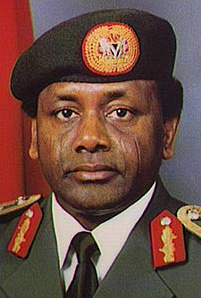Sani Abacha | |
|---|---|
 Portrait, c. 1993–1998 | |
| 10th Head of State of Nigeria | |
| In office 17 November 1993 – 8 June 1998 | |
| Chief of General Staff | Oladipo Diya |
| Preceded by | Ernest Shonekan |
| Succeeded by | Abdulsalami Abubakar |
| Defence Minister of Nigeria | |
| In office August 1990 – 8 June 1998 | |
| President | Ibrahim Babangida Ernest Shonekan Himself |
| Preceded by | Domkat Bali |
| Succeeded by | Abdulsalami Abubakar |
| Chief of Defence Staff | |
| In office August 1990 – 17 November 1993 | |
| President | Ibrahim Babangida Ernest Shonekan |
| Preceded by | Domkat Bali |
| Succeeded by | Oladipo Diya |
| Chief of Army Staff | |
| In office August 1985 – August 1990 | |
| President | Ibrahim Babangida |
| Preceded by | Ibrahim Babangida |
| Succeeded by | Salihu Ibrahim |
| Personal details | |
| Born | 20 September 1943 Kano, Northern Region, British Nigeria (now Kano, Kano, Nigeria) |
| Died | 8 June 1998 (aged 54) Aso Villa, Abuja, Nigeria |
| Cause of death | Disputed |
| Political party | none (military) |
| Spouse | Maryam Abacha |
| Children | See
|
| Occupation | Military officer |
| Signature |  |
| Military service | |
| Allegiance | |
| Branch/service | |
| Years of service | 1963–1998 |
| Rank | |
| Battles/wars | Nigerian Civil War First Liberian Civil War |
Sani Abacha GCFR ((); (20 September 1943 – 8 June 1998) was a Nigerian military dictator and statesman who ruled Nigeria as the military head of state from 1993 following a palace coup d'état until his sudden death in 1998.[1][2]
Abacha's seizure of power was the last successful coup d'état in Nigerian military history. He wielded power with an unyielding attitude and his rule heralded an unprecedented total disregard for human rights with several political assassinations and summary executions of dissidents and political opponents in Nigeria. His rule drew disrepute to the country with Nigeria becoming a pariah state in international relations particularly with regards to the execution of environmental activist Ken Saro-Wiwa.[3][4]
Sani Abacha was one of the twentieth century's[5] most corrupt dictators as a kleptocrat for the alleged embezzlement of US$2–5 billion. Abacha, and his family allegedly hid most of the loot abroad in Switzerland, as well as in other jurisdictions including Liechtenstein, the United Kingdom and the United States.[6][7][8][9][10] Abacha's death on 8 June 1998 brought about the Nigerian Fourth Republic a year later and he was succeeded as Nigeria's head of state by General Abdulsalami Abubakar.
- ^ Okocha, Chuks (16 June 2021). "Al-Mustapha: How Abacha Died". This day live.com. Retrieved 11 February 2023.
- ^ Kaufman, Michael T. (9 June 1998). "NEW CHAPTER IN NIGERIA: THE OBITUARY; Sani Abacha, 54, a Beacon of Brutality In an Era When Brutality Was Standard". The New York Times. Retrieved 11 February 2023.
- ^ Kaufman, Michael T. (9 June 1998). "NEW CHAPTER IN NIGERIA: THE OBITUARY; Sani Abacha, 54, a Beacon of Brutality in an Era when Brutality Was Standard". The New York Times.
- ^ "Nigeria: Statements on Assassination, 6/5/'96".
- ^ "The World's All-Time Most Corrupt Leaders". Forbes. Retrieved 22 May 2024.
- ^ Barrett, Devlin (5 March 2014). "U.S. Seizes Largest Ever Embezzlement by Foreign Dictator". Wall Street Journal. Retrieved 26 May 2020.
- ^ "African kleptocrats are finding it tougher to stash cash in the West". The Economist. 10 October 2019. Retrieved 26 May 2020.
- ^ Olawoyin, Oladeinde (23 May 2018). "Again, Buhari lauds late kleptocrat dictator, Sani Abacha". Premium Times (Nigeria). Retrieved 26 May 2020.
- ^ "U.S. Freezes More Than $458 Million Stolen by Former Nigerian Dictator in Largest Kleptocracy Forfeiture Action Ever Brought in the U.S." US Department of Justice. 5 March 2014. Retrieved 26 May 2020.
- ^ "Nigeria to recover $300m stolen by its former military ruler". Al Jazeera. Retrieved 8 October 2020.